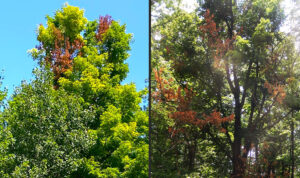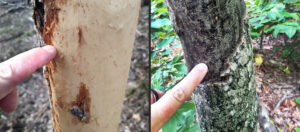By Linda Williams, DNR Forest Health Specialist, Woodruff
Linda.Williams@wisconsin.gov or 920-360-0665

Two photos show maple branches that died recently due to previous damage from squirrels. / Photo Credit: Linda Williams, Wisconsin DNR
Have you noticed maple branches suddenly dying this summer?
Sudden mortality of maple branches during the summer in northern Wisconsin is often a result of squirrel damage that occurred in late winter and early spring.
In late winter and early spring, gray squirrels strip the bark of maples to get at the sweet maple sap. When the damage is extensive or severe, entire trees or branches will be killed immediately and will not leaf out in the spring.
Lesser amounts of damage can remove the bark from just part of a branch; the leaves will expand as normal in the spring, but as the summer warms up and the branch needs more water, it struggles to maintain those leaves. A day or two of very hot weather or hot and dry weather, can cause these branches to fail suddenly when they can’t move enough water to keep the branch alive.

Squirrel damage in late winter is brightly colored, as shown at left, but fades to grey/black during summer and causes damaged areas to be difficult to distinguish from bark, at right. / Photo Credit: Linda Williams, Wisconsin DNR.
When the squirrels first strip the bark from trees in late winter or early spring, the damaged areas look white and are clearly visible. As spring transitions into summer, the damaged areas will darken and become dark gray or black in color, blending with the gray bark and making them difficult to distinguish from the ground.
Reducing squirrel populations in your area is one of the few control options for minimizing this damage in forests.
